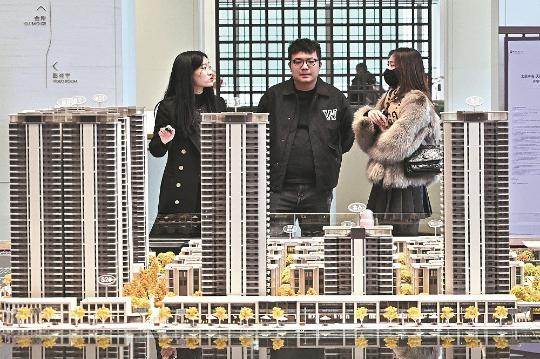Green shoots seen in real estate sector

A property agent introduces housing to potential homebuyers in Taiyuan, Shanxi province. WEI LIANG/CHINA NEWS SERVICE)
Prices of commercial residential properties in China's first-tier cities rose month-on-month in December, while the overall decline in second and third-tier cities narrowed, signaling a pickup in market sentiment and a stop to the downturn in the real estate sector, officials and analysts said.
This year, policymakers are expected to further relax home purchase restrictions, ease the financial burden of homebuyers and push ahead with redevelopment initiatives of rundown urban villages, in order to help the housing market gain a more solid footing in its recovery, they added.
The reduction in the purchase threshold and repayment pressures due to the government's recent targeted policy support, has rekindled enthusiasm among homebuyers, said Kang Yi, head of the National Bureau of Statistics, at a news conference on Friday.
The improved demand-supply dynamics have contributed to the moderation of price fluctuations in the real estate market, Kang said, adding that 23 of the 70 large and medium-sized cities monitored by the bureau saw month-on-month increases in sale prices of new commercial residential properties, while nine cities experienced a rise in secondhand home prices.
New home prices in first-tier cities — Beijing and Shanghai, as well as Guangzhou and Shenzhen in Guangdong province — rose by 0.2 percent month-on-month in December, marking the first increase since June 2023, Kang said.
Furthermore, sale prices of secondhand homes in these top-tier cities also increased by 0.3 percent compared to the previous month, extending the growth trend for a third consecutive month, Kang said.
New home prices in second-tier cities remained flat on a monthly basis in December, reversing a decline recorded in the previous month. Meanwhile, third-tier cities continued to see narrowed month-on-month price declines for a fourth consecutive month, Kang added.
The multifaceted factors at play — the government's continuous policy refinement, the restoration of consumer sentiment and the year-end release of market demand — have collectively fueled a stabilization of the real estate sector, said Chen Wenjing, director of market research at the China Index Academy.
The positive developments in first-tier cities are likely to have a ripple effect, inspiring confidence and reigniting demand in smaller urban markets, further solidifying the overall stabilization of the housing sector this year, Chen added.
According to a monthly survey of 70 major and medium-sized cities conducted by the NBS, the proportion of real estate industry professionals who expect the prices of new commercial residential properties to remain stable or increase over the next six months reached 69.3 percent in December, up 0.8 percentage points from the previous month.
Looking ahead, it's imperative to exert sustained efforts to ensure a stable recovery next year, as outlined during the annual Central Economic Work Conference where the nation's policymakers set the policy agenda for the world's second-largest economy in mid-December.
The real estate market has seen an increasingly positive shift in recent times, thanks to coordinated government policy support. As these initiatives continue to gain traction, the market is expected to continue improving in the coming period, Kang said.
The long-term outlook for the real estate market remains promising, driven by the ongoing process of China's new-type urbanization and the persistent demand for both essential and improvement-oriented housing, Kang added.
This year, coordinated efforts are needed to tap into latent housing demand, setting the stage for a more robust and sustainable growth trajectory, said Yan Yuejin, deputy director of E-house China R&D Institute.
The expansion of urban village redevelopment, the scaling up of housing resettlement through monetized compensation, and the relaxation of purchase restrictions in core cities, alongside optimizing policies related to down payments, interest rates, and taxes, should be advanced in parallel this year, Yan said.
Local governments should be encouraged to leverage special-purpose bonds to reclaim and acquire idle land from struggling developers, while the relending facility dedicated to purchasing unsold commercial homes as affordable housing will be further enhanced, Yan added.

